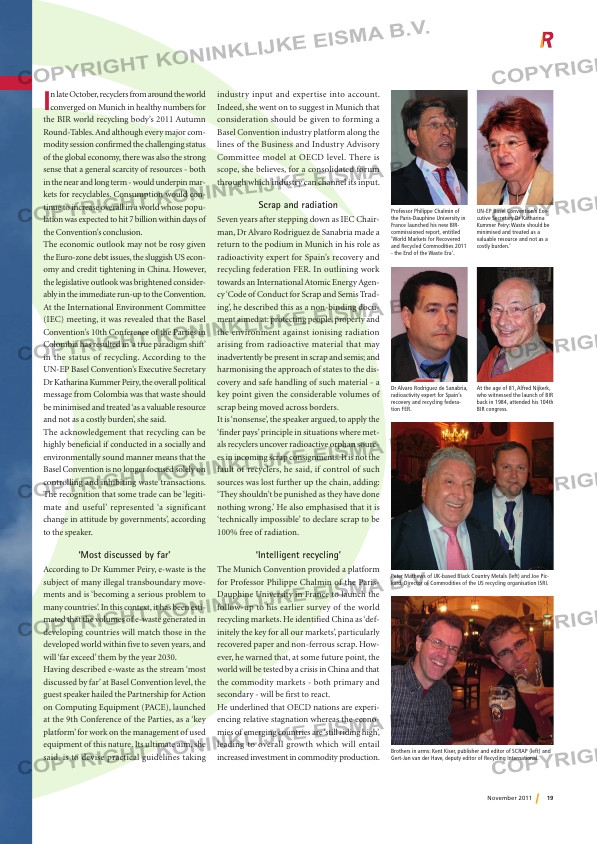Page 19 from: November 2011

19November 2011
In late October, recyclers from around the world converged on Munich in healthy numbers for
the BIR world recycling body’s 2011 Autumn
Round-Tables. And although every major com-
modity session confirmed the challenging status
of the global economy, there was also the strong
sense that a general scarcity of resources – both
in the near and long term – would underpin mar-
kets for recyclables. Consumption would con-
tinue to increase overall in a world whose popu-
lation was expected to hit 7 billion within days of
the Convention’s conclusion.
The economic outlook may not be rosy given
the Euro-zone debt issues, the sluggish US econ-
omy and credit tightening in China. However,
the legislative outlook was brightened consider-
ably in the immediate run-up to the Convention.
At the International Environment Committee
(IEC) meeting, it was revealed that the Basel
Convention’s 10th Conference of the Parties in
Colombia has resulted in ‘a true paradigm shift’
in the status of recycling. According to the
UN-EP Basel Convention’s Executive Secretary
Dr Katharina Kummer Peiry, the overall political
message from Colombia was that waste should
be minimised and treated ‘as a valuable resource
and not as a costly burden’, she said.
The acknowledgement that recycling can be
highly beneficial if conducted in a socially and
environmentally sound manner means that the
Basel Convention is no longer focused solely on
controlling and inhibiting waste transactions.
The recognition that some trade can be ‘legiti-
mate and useful’ represented ‘a significant
change in attitude by governments’, according
to the speaker.
‘Most discussed by far’
According to Dr Kummer Peiry, e-waste is the
subject of many illegal transboundary move-
ments and is ‘becoming a serious problem to
many countries’. In this context, it has been esti-
mated that the volumes of e-waste generated in
developing countries will match those in the
developed world within five to seven years, and
will ‘far exceed’ them by the year 2030.
Having described e-waste as the stream ‘most
discussed by far’ at Basel Convention level, the
guest speaker hailed the Partnership for Action
on Computing Equipment (PACE), launched
at the 9th Conference of the Parties, as a ‘key
platform’ for work on the management of used
equipment of this nature. Its ultimate aim, she
said, is to devise practical guidelines taking
industry input and expertise into account.
Indeed, she went on to suggest in Munich that
consideration should be given to forming a
Basel Convention industry platform along the
lines of the Business and Industry Advisory
Committee model at OECD level. There is
scope, she believes, for a consolidated forum
through which industry can channel its input.
Scrap and radiation
Seven years after stepping down as IEC Chair-
man, Dr Alvaro Rodriguez de Sanabria made a
return to the podium in Munich in his role as
radioactivity expert for Spain’s recovery and
recycling federation FER. In outlining work
towards an International Atomic Energy Agen-
cy ‘Code of Conduct for Scrap and Semis Trad-
ing’, he described this as a non-binding docu-
ment aimed at: protecting people, property and
the environment against ionising radiation
arising from radioactive material that may
inadvertently be present in scrap and semis; and
harmonising the approach of states to the dis-
covery and safe handling of such material – a
key point given the considerable volumes of
scrap being moved across borders.
It is ‘nonsense’, the speaker argued, to apply the
‘finder pays’ principle in situations where met-
als recyclers uncover radioactive orphan sourc-
es in incoming scrap consignments. It is not the
fault of recyclers, he said, if control of such
sources was lost further up the chain, adding:
‘They shouldn’t be punished as they have done
nothing wrong.’ He also emphasised that it is
‘technically impossible’ to declare scrap to be
100% free of radiation.
‘Intelligent recycling’
The Munich Convention provided a platform
for Professor Philippe Chalmin of the Paris-
Dauphine University in France to launch the
follow-up to his earlier survey of the world
recycling markets. He identified China as ‘def-
initely the key for all our markets’, particularly
recovered paper and non-ferrous scrap. How-
ever, he warned that, at some future point, the
world will be tested by a crisis in China and that
the commodity markets – both primary and
secondary – will be first to react.
He underlined that OECD nations are experi-
encing relative stagnation whereas the econo-
mies of emerging countries are ‘still riding high’,
leading to overall growth which will entail
increased investment in commodity production.
BIR meets in Munich
UN-EP Basel Convention’s Exe-
cutive Secretary Dr Katharina
Kummer Peiry: Waste should be
minimised and treated as a
valuable resource and not as a
costly burden.’
Professor Philippe Chalmin of
the Paris-Dauphine University in
France launched his new BIR-
commissioned report, entitled
‘World Markets for Recovered
and Recycled Commodities 2011
– the End of the Waste Era’.
Dr Alvaro Rodriguez de Sanabria,
radioactivity expert for Spain’s
recovery and recycling federa-
tion FER.
At the age of 81, Alfred Nijkerk,
who witnessed the launch of BIR
back in 1984, attended his 104th
BIR congress.
Peter Mathews of UK-based Black Country Metals (left) and Joe Pic-
kard, Director of Commodities of the US recycling organisation ISRI.
Brothers in arms: Kent Kiser, publisher and editor of SCRAP (left) and
Gert-Jan van der Have, deputy editor of Recycling International.
p01 _ nt o.indd 1 07-11-11 11:00



